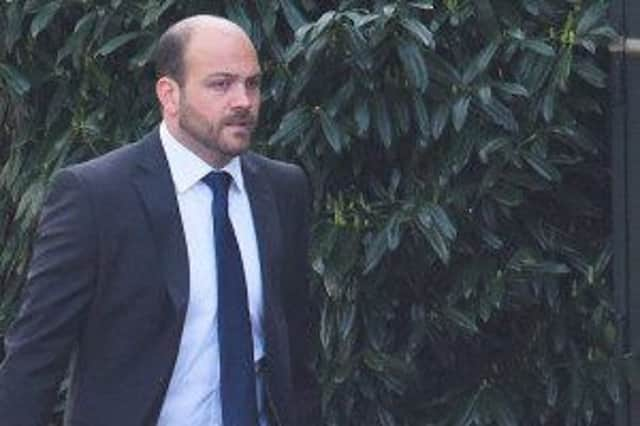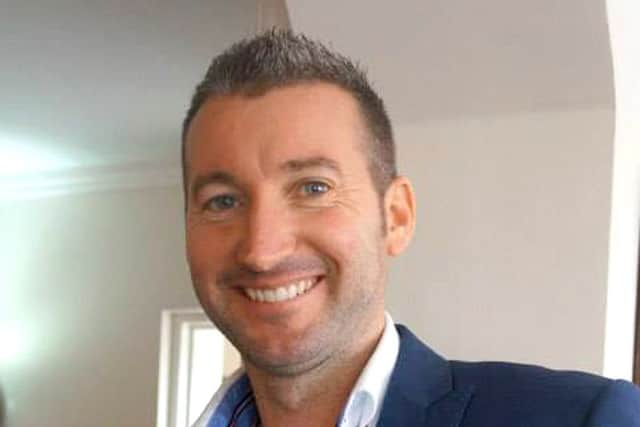Fatal boat crash was entirely avoidable, jury told


Businessman Aaron Brown is on trial at Winchester Crown Court accused of the manslaughter of his friend of 20 years Ryan McKinlay, 36, of Gosport.
The dad-of-one died on June 19 during a trip on a 38-tonne motor cruiser called True Blue, when a smaller tender piloted by Brown and with Mr McKinlay a passenger, crashed into the larger boat.
Advertisement
Hide AdAdvertisement
Hide AdThe jury have been told the prosecution case is Brown, chief operating officer of One Com, drove too close and too fast to the larger boat.


Today Paul Glatzel, one of only five people in the world the Royal Yachting Association has train powerboat instructors’ teachers’ instructors, said the crash was ‘entirely avoidable’.
He said the defence case that Brown put the boat into reverse using a deflector on the back of the tender was ‘not consistent’ with video footage, recorded by Mr McKinlay’s wife standing on True Blue, of the incident in Osborne Bay off Isle of Wight in 2015.
Giving evidence on the third day of the trial, Mr Glatzel said: ‘The Rib was driven too fast, too close to True Blue and that’s why the Rib impacted the stern to True Blue.
Advertisement
Hide AdAdvertisement
Hide Ad‘Quite why it turned we could debate for a long time but it misses the point that it was entirely avoidable by not driving it that fast, that close to True Blue.’


Earlier he said ‘That speed closing on a hard object is a significant risk and that doesn’t diminish necessarily by passing across the stern that way or turning away to the right hand side.
‘If not at the start of the video or well before the video, the danger should have been apparent.’
He told jurors he estimated the Williams Turbojet 325 was travelling between 27 to 32mph, or 25 to 30 knots, at the time it was approaching the True Blue.
Advertisement
Hide AdAdvertisement
Hide AdHe said by the sound on the video footage played in court the revs of the engine did not reduce at around 10 metres away from the larger boat.
Mr Glatzel said the smaller boat would have been travelling at 28mph, when less than a second away from the boat.
‘The danger would have been seen some while before that and in terms of what he could do to avoid it at that stage it’s at the lap of the gods as to what you can do in a second to avoid that impact,’ he said.
The court heard the Brown contends he put the tender into reverse before the crash but Mr Glatzel said that was ‘not consistent’ with the video footage.
Advertisement
Hide AdAdvertisement
Hide AdHe said: ‘It’s certainly not impossible and when I was asked to assess that I’d say I cant say it’s impossible.
‘I can’t say it is consistent with what was on the video.
‘Both from the sound where the the sound shows it’s not consistent with throttle having been reduced and some revs coming off and going into reverse at that stage.’
Asked if it was more or less likely the deflector at the back of the boat was engaged, he said: ‘I’ve looked at these videos many hundreds of times and spent a lot of time looking at these and I’m quite confident reverse wasn’t engaged at this stage.’
Asked by Trevor Burke QC, for Brown, if the speed was safe when the boat was further away from True Blue, Mr Glatzel said: ‘The boat should not be travelling anywhere near that speed near to the stern of True Blue.’
Advertisement
Hide AdAdvertisement
Hide AdAsked if Brown was in control, he said: ‘I would look at it and say he’s not in control otherwise he would not have been there doing that in the first place.’
Brown, 34, Botley Road, Curdridge, denies manslaughter by gross negligence.
The True Blue skipper hired for the day, Paul Carey, 52, of Chatsworth Road, Southampton, denies a charge of driving too fast in contravention of Merchant Shipping regulations, in relation to earlier driving of the Williams Turbojet 325 the same afternoon.
(Proceeding)